Al Gore "An Inconvenient Truth"

Al Gore "An Inconvenient Truth" |
 |
Part 6 (1:03:54 - 1:09:53) |
|
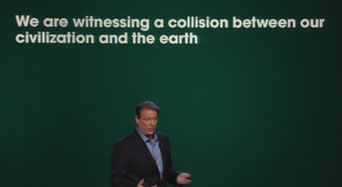 |
We are witnessing a collision between our civilization and the Earth. There are three factors that are causing this collision. 1. Population And the first is population – when the baby boom generation was born after WW II, the population had just crossed the 2 billion mark. I’m in my 50s and it’s already gone to 6 billion. If I reach the demographic expectation for the baby boomers, it will go over 9 billion. |
If it takes 10,000 generations to reach 2 billion and then, in one human lifetime, ours, it goes from 2 billion to 9 billion, something profoundly different is going on right now. |
|
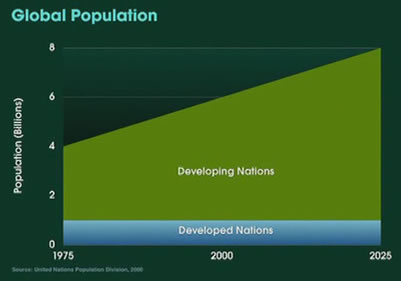 |
We’re putting more pressure on the Earth. Most of it is in the poorer nations of the world. It puts pressure on food demand. It puts pressure on water demand. It puts pressure on vulnerable natural resources, and this pressure is one of the reasons we have seen such devastation of the forest, not only tropical but elsewhere. It is a political issue. |
 |
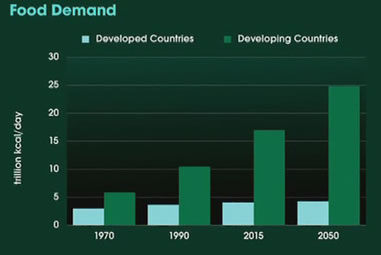 |
Almost 30% of the CO2 that goes up into the atmosphere each year comes from forest burning. This is a time-lapse picture of the Earth at night over a six month period showing the lights of the cities in white and the burning forests and brush fires in red. The yellow areas are the gas flares like these in Siberia. |
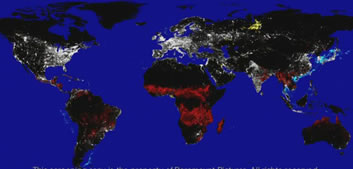 |
2. Technology And that brings me to the second factor that has transformed our relationship to the Earth. The scientific and technological revolution is a great blessing in that it has given us tremendous benefits in medicine and communication. But this new power that we have also brings a responsibility to think about its consequences.
|
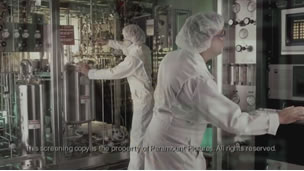 |
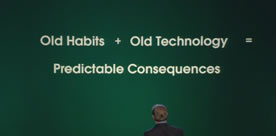 |
Here’s a formula to think about. Old habits plus old technology have predictable consequences. Old habits plus new technology can have dramatically altered consequences. |
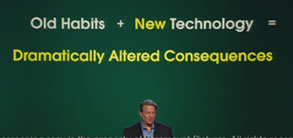 |
But then a new technology came. (Atomic bomb blast.) We have to think differently about war because the new technologies so completely transformed the consequences of that old habit that we can’t just mindlessly continue the patterns of the past. |
||
In the same way we have always exploited the Earth for sustenance. For most of our existence we used relatively simple tools: the plow, the tractor. But even tools like shovels are different now. A shovel used to be like this. Shovels have gotten bigger and every year they get more powerful. So our ability to have an effect on the surface of the Earth is utterly transformed. You can say the same thing about irrigation, which is a great thing, but when we divert rivers without considering the consequences, then sometimes rivers never reach the sea. There were two rivers in central Asia that were used by the former Soviet Union for irrigating cotton fields unwisely. The Aral Sea was fed by them and used to be the fourth largest inland sea in the world. When I went there I saw this strange sight of an enormous fishing fleet resting in the sand. This is the canal that the fishing industry desperately tried to build to get to the receding shoreline. Making mistakes in our dealings with nature can have bigger consequences now because our technologies are often bigger than the human scale. When you put them all together they made us a force of nature. And this is also a political issue. |
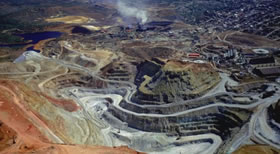 |
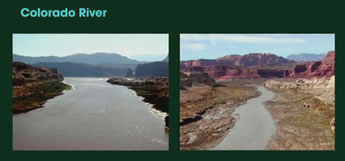 |
|
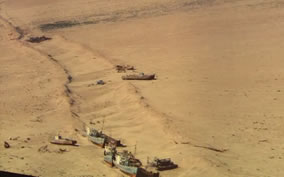 |
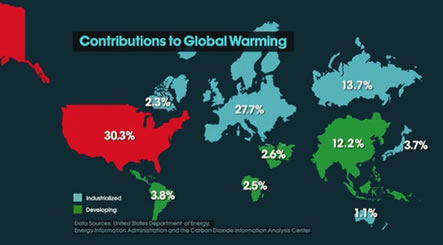 |
This is a computer map of the world that purports to show the relative contributions to global warming. In our country we are responsible for more than all of South America, all of Africa, all of the Middle East, all of Asia all combined. |
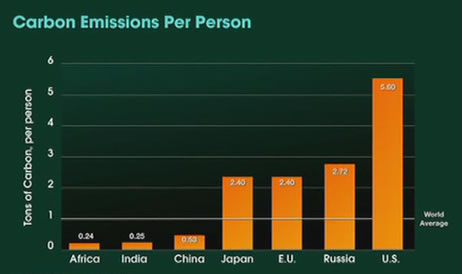 |
The per capita average in Africa, India, China, Japan, EU, Russia, here’s where we are - way, way above everyone else. |
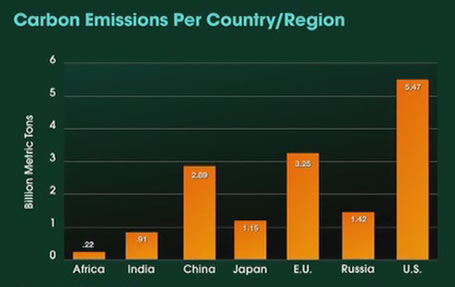 |
If you take population into account it’s a little bit different. China’s playing a bigger role, so is Europe, but we are still by all odds the largest contributor. And so it is up to us to look at how we think about it. |
3. Our Way of Thinking Our way of thinking is the third and final factor that transforms our relationship to the Earth. If a frog jumps into a pot of boiling water, it jumps right out again, because it senses the danger. But the very same frog if it jumps into a pot of lukewarm water that is slowly brought to a boil, will just sit there and it won’t move. It will just sit there even as the temperature continues to go up and up. It will stay there until.. until.. it is rescued. It is important to rescue the frog. But the point is this: Our collective nervous system is like that frog’s nervous system. It takes a sudden jolt sometimes before we become aware of a danger. If it seems gradual, even if it really is happening quickly, we are capable of just sitting there and not reacting. |
 |
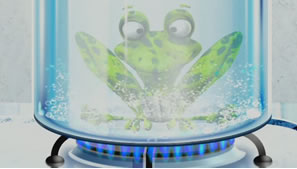 |